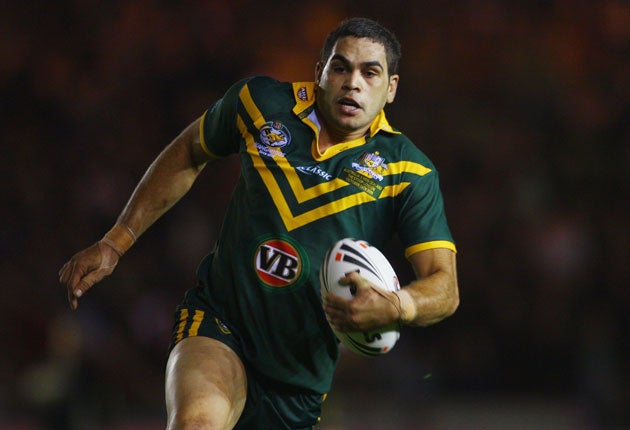Racism alive and kicking on Australia's pitches
Three incidents in which Aboriginal players were subjected to foul-mouthed abuse have shamed rugby and Aussie rules football

Your support helps us to tell the story
From reproductive rights to climate change to Big Tech, The Independent is on the ground when the story is developing. Whether it's investigating the financials of Elon Musk's pro-Trump PAC or producing our latest documentary, 'The A Word', which shines a light on the American women fighting for reproductive rights, we know how important it is to parse out the facts from the messaging.
At such a critical moment in US history, we need reporters on the ground. Your donation allows us to keep sending journalists to speak to both sides of the story.
The Independent is trusted by Americans across the entire political spectrum. And unlike many other quality news outlets, we choose not to lock Americans out of our reporting and analysis with paywalls. We believe quality journalism should be available to everyone, paid for by those who can afford it.
Your support makes all the difference.As supporters of a rival team hurled racial abuse, Nicky Winmar, a brilliant Aboriginal player of Australian rules football, walked over to them, lifted his jersey and pointed defiantly to his skin. It was a defining moment in Australian sport, and it sparked robust action by football authorities to stamp out racism. That was in 1993. Now, nearly two decades on, the Australian Football League(AFL) and rugby league are engulfed in an ugly racism row, after three sporting veterans in one week used language that many Australians believed had been consigned to the past.
The controversy broke last weekend, when it emerged that Andrew Johns, a former rugby league Test captain, had referred to an Aboriginal player, Greg Inglis, as a "black cunt". Inglis is on the Queensland squad; Johns was – until that remark – assistant coach of New South Wales.
The two teams were preparing to play their fiercely contested State of Origin, an annual best-of-three match series which is the highlight of the rugby league calendar. Timana Tahu, a half-Aboriginal, half-Maori player, withdrew from NSW in protest. Johns had no choice but to fall on his sword.
There was another claim, made by an Aborignal elder but subsequently strongly denied both by Tahu and by the management of Andrew Johns, that Johns had racially abused other indigenous Queensland players during a pep talk at the NSW training camp.
Rugby league bosses must have inwardly groaned: this was the last thing they needed after recent revelations that one leading team, the Melbourne Storm, had for years paid their players above the maximum permitted. The Storm were stripped of their 2007 and 2009 premiership titles, fined $A500,000 (£290,000) and banned from accruing competition points this season.
Then it was the turn of AFL, or Aussie rules. Addressing a mid-week charity lunch in Melbourne, Mal Brown, a former player and Western Australia coach, recalled poor lighting at a fundraising match against Victoria 15 years ago. "It actually disadvantaged us," he said. "We couldn't pick any of the cannibals. All the good black fellows, we couldn't pick them because [we] couldn't see them in the light... we didn't even get any white shirts to put on them."
This drew laughter from the audience, but horrified another former AFL great, Garry Lyon. "You've just put us on the back page of every paper tomorrow," he told Brown. As it turned out, the story made at least one front page. Brown defended his remarks as "totally in jest", but then apologised, saying: "People told me it wasn't humorous and I've made a dickhead of myself. Now I accept that."
On Friday, AFL – the sport that vowed to reform itself after the Winmar incident – was once again dragged into the mire. At a function in South Australia, a former Aussie rules star, Robert DiPierdomenico, described another former player, Gavin Wanganeen, as "not bad for an Abo". He was promptly suspended as the face of Auskick, an AFL programme aimed at encouraging children to play the sport.
The irony, as some commentators pointed out, is that all three men – Johns, Brown and DiPierdomenico – have worked hard to train young indigenous players. Yet they appear not to grasp the niceties of language, or the offence it can cause. Brown protested that in the past "cannibal" and "little black buggers" had been used as terms of endearment.
Johns said in his latest apology: "I look forward to sitting down with Timana and learning from him what is acceptable when it comes to sensitive issues like this." As one columnist noted: "You have to shake your head. We have made it through slavery, through colonisation, through apartheid... and we still need to be told in person that calling somebody a 'black cunt' is unacceptable."
Join our commenting forum
Join thought-provoking conversations, follow other Independent readers and see their replies
Comments